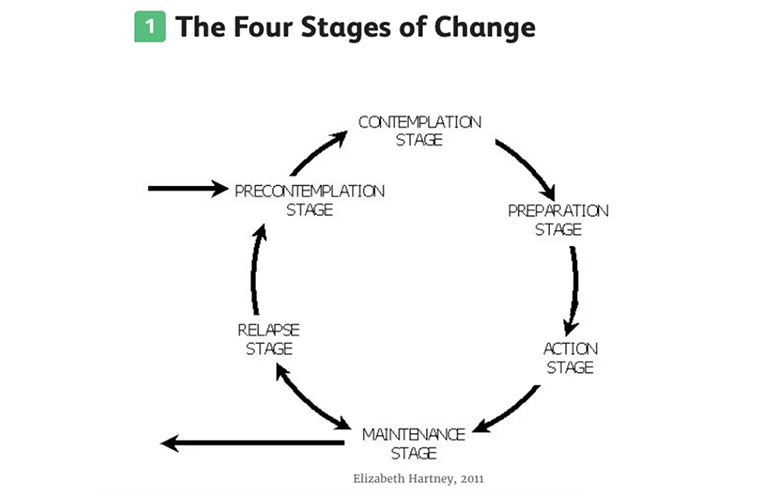Crystal Parish – Vice President of Clinical Operations
Making any change in life—that is, real, genuine, lasting change—is no easy endeavour. Doing so requires confidence, a plan, and self belief. Treating substance use issues is no different. If a person truly wants to make a change and start on the road to recovery, it requires an authentic commitment to changing your behavior and developing new ways of coping.
You may be thinking, ‘well, I’m off the substance, now what?’ Deciding not to use drugs and alcohol is just the first step. It’s crucial to think of your recovery holistically and commit to making other life changes that will support your path toward sustained recovery. You need to reimagine how you use your time and energy, and consider whether it is truly beneficial to your personal growth.
According to Elizabeth Hatney, BSC, MSC, MA, PHD, and John C. Umhau, MD, MPH, CPE, the “stages of change” model is a way of describing the process that someone undergoes to overcome addiction. While the stages of change paradigm can be applied to a range of other behaviors that people seek to change permanently, it is most widely utilized as a tool in substance use recovery.
Researchers studying how change occurs in “natural recovery” from addictions developed this model, and health care providers have since adopted it.
The Four Stages of Change:
1. Precontemplation
2. Contemplation
3. Preparation
4. Action
Additional stages include:
1. Maintenance
2. Relapse
These stages are visually represented as a cycle, so theoretically, people would go through stages linearly. However, people actually can bounce around between stages and even be in two stages simultaneously.
It is important throughout all stages of change, though particularly during the action and maintenance phases, to make other changes in your life that can help you with coping and reduce triggers in your everyday environment. These become safe, reliable outlets with which to manage stress, and they can be immensely helpful in sustaining recovery and preventing relapse.
Beyond giving up substances, it is important to initiate other types of change in your life. Some people find it extremely helpful to change their physical space. This could look like mixing up your physical surroundings, redecorating your living space, or changing up the places where you spend time.
According to Dr. Harry L Haroutunian, who has been working in the field of addiction and substance use for over 40 years, forging change in recovery is incredibly important because people who give up addiction are agreeing to make a major, life-altering adjustment, and their lifestyle choices must coincide with this commitment.
Researchers have established that people who deal with substance use issues need to make changes to their lifestyle—often major ones—in order to continue on their recovery journey successfully. Thus, it is integral for those going through recovery to consider what other adjustments in their life will foster a safe, healing environment to develop confidence and grow as a person.
Developing new hobbies or picking up old passion projects is another great way to contribute positively to your long term recovery. New hobbies help you rewire your brain and keep you feeling present. Mindfulness is often a big component of something new and challenging, as progressing in something new requires a great deal of effort. Additionally, new hobbies can come with new communities, people with whom you share meaningful connections in a low-risk environment that doesn’t center around alcohol or other substances.
Whatever change you make—be it educational, professional, a new hobby, a new sport or spiritual practice etc.—you are exercising your brain in a beneficial way and developing coping mechanisms that will help you sustain sobriety long-term.


